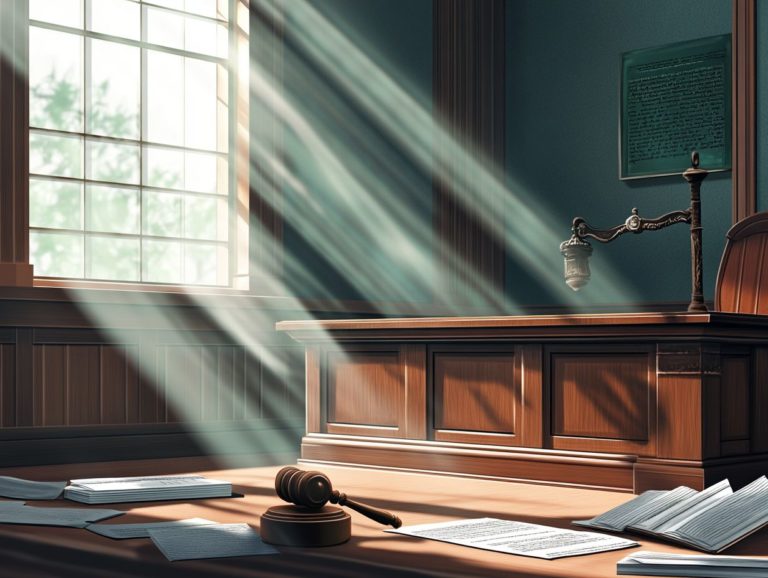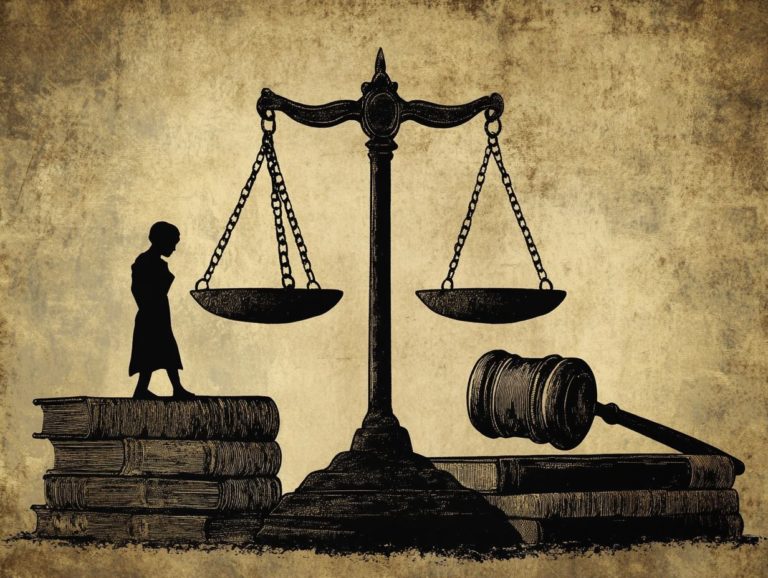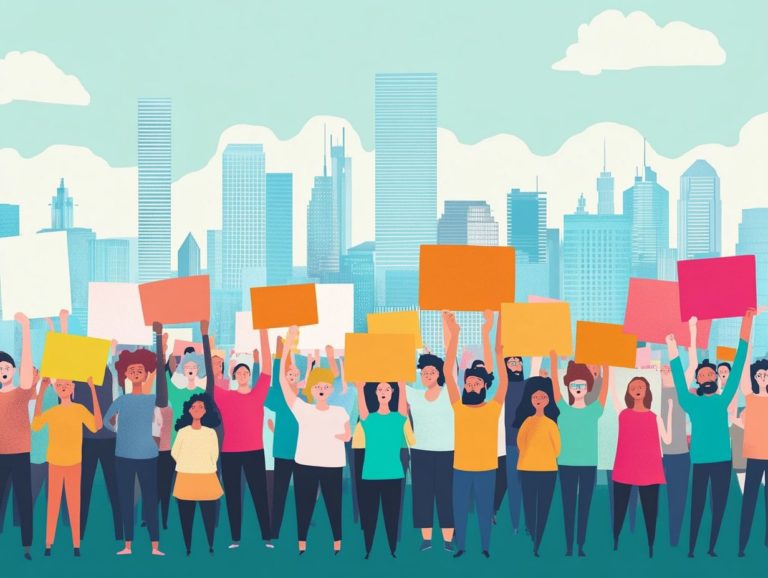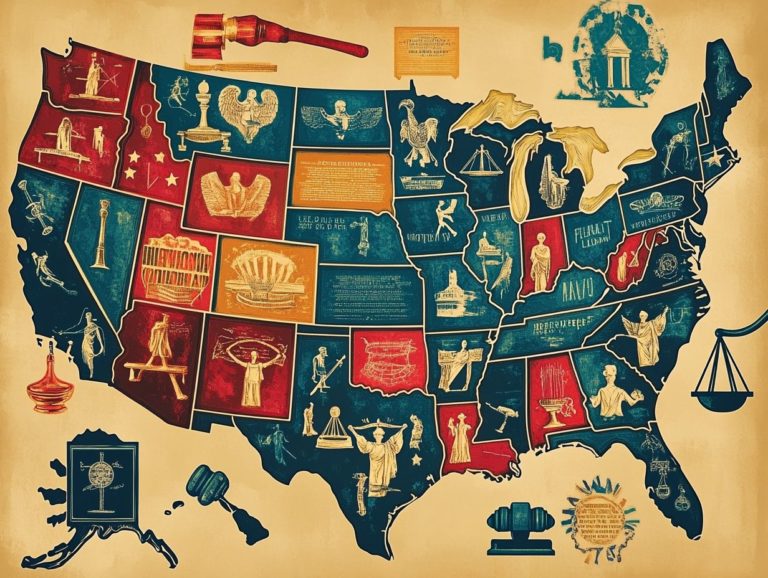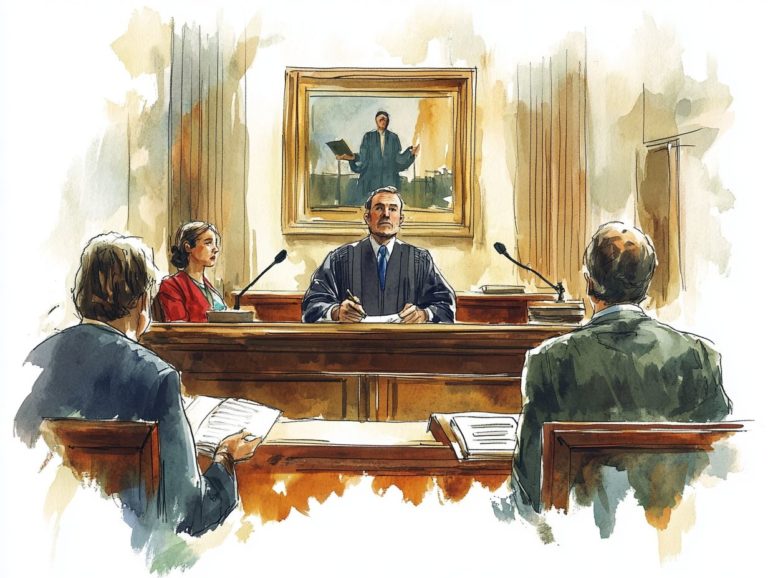The Right to Request a Change of Venue
Navigating the legal landscape can feel like solving an intricate puzzle, especially when it comes to a change of venue. This article delves into what a change of venue truly entails, its purpose, and the reasons individuals might pursue it, particularly regarding potential biases or conflicts.
You ll find a detailed breakdown of the legal process for filing a motion, the key factors courts weigh when considering such requests, and the challenges that may arise along the way. We will also explore alternative strategies to address concerns about fairness.
Whether you re a legal professional or simply intrigued by the topic, this guide offers valuable insights into this essential aspect of the judicial system.
Contents
- Key Takeaways:
- Understanding Change of Venue
- Reasons to Request a Change of Venue
- Legal Process for Requesting a Change of Venue
- Factors Considered in Granting a Change of Venue
- Challenges and Limitations of Change of Venue
- Alternatives to Change of Venue
- Frequently Asked Questions
- What is the right to request a change of venue?
- Who has the right to request a change of venue?
- What are acceptable reasons for requesting a change of venue?
- How do I request a change of venue?
- Is there a guarantee that my request for a change of venue will be granted?
- What happens if my request for a change of venue is granted?
Key Takeaways:
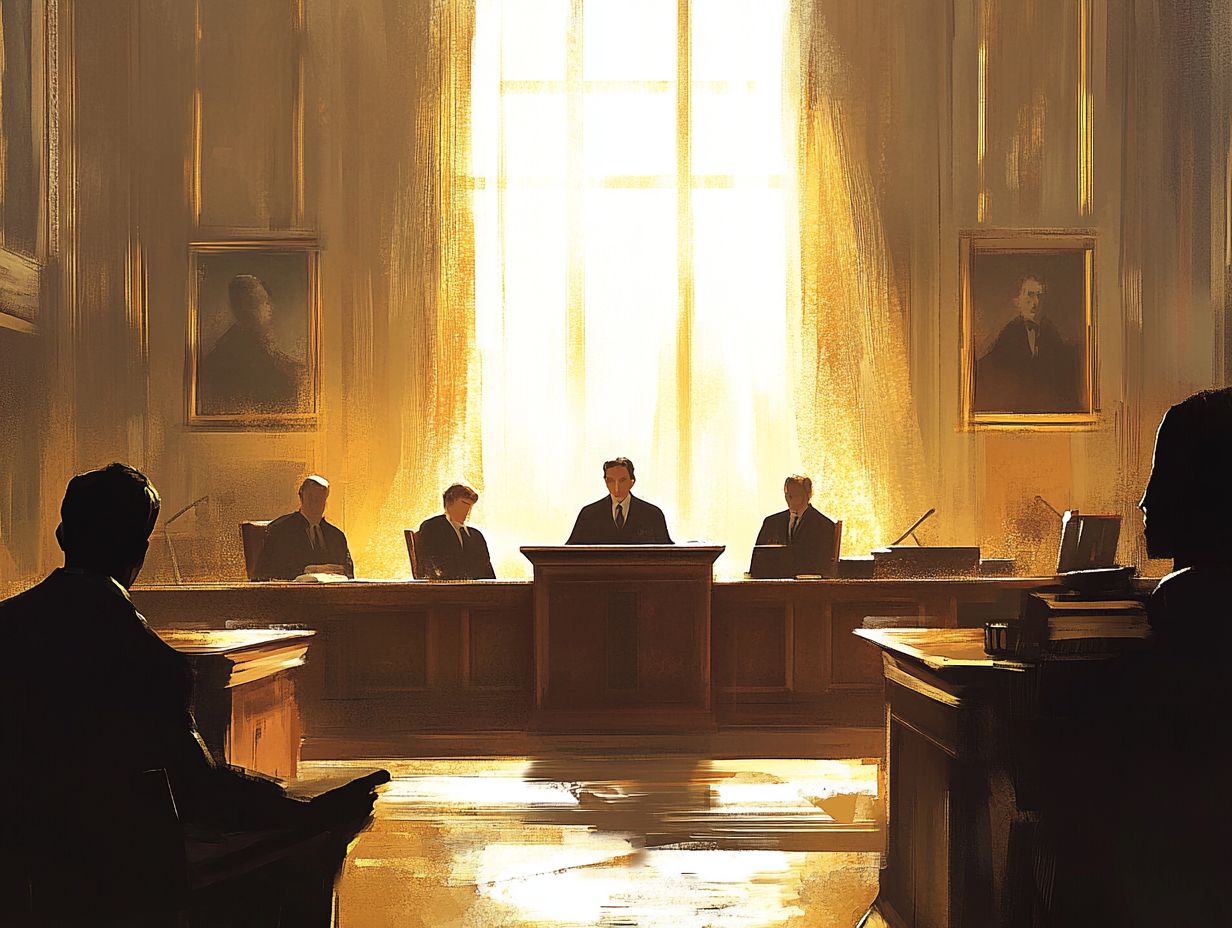
- The right to request a change of venue allows defendants to seek a fair trial in a different location where biases may not exist.
- The legal process for requesting a change of venue involves filing a motion and presenting evidence to support the need for a change, but the final decision lies with the judge.
- While there are challenges to obtaining a change of venue, alternative legal strategies can address biases and conflicts in a trial.
Understanding Change of Venue
Understanding the importance of a change of venue is crucial for safeguarding fair trial rights in the United States, especially in criminal cases where excessive pre-trial publicity could compromise juror impartiality.
A change of venue is a legal procedure that allows the relocation of a trial from one judicial district to another. This often happens in response to concerns about biased publicity or community characteristics that could affect judgment.
This process is vital for maintaining the integrity of the judicial system and protecting the rights of both the defendant and the victim, particularly in high-profile cases like the Oklahoma City Bombing and the Menendez brothers.
Reasons to Request a Change of Venue
There are many compelling reasons to consider requesting a change of venue, especially when the status of both the defendant and the victim could be impacted by biased publicity and sensational media coverage.
Community characteristics and the specifics of the case are important in assessing the necessity of such a change. In criminal cases, if excessive media attention threatens juror impartiality, attorneys may file a motion for a change of venue to secure a fair trial for all involved.
Potential Biases and Conflicts
Potential biases and conflicts can greatly affect a juror’s ability to remain impartial, especially in cases that have received significant media attention. This coverage can distort public perception and complicate jury selection.
When jurors are bombarded with extensive coverage or community opinions, it s natural to form preconceived notions about both the defendant and the victim, which can sway the trial’s outcome.
These biases can manifest in various forms, including racial, socioeconomic, and emotional biases, often intensified by sensationalized news reports. The challenge lies in maintaining fairness and objectivity in the face of such external influences.
As a trial attorney, one may identify potential biases during jury selection by asking targeted questions designed to uncover jurors’ attitudes and preconceptions. They may also mitigate the effects of biased publicity through careful jury instructions and motions for a change of venue. Effectively addressing these challenges is crucial for preserving the judicial process’s integrity and ensuring a fair trial for all involved.
Legal Process for Requesting a Change of Venue
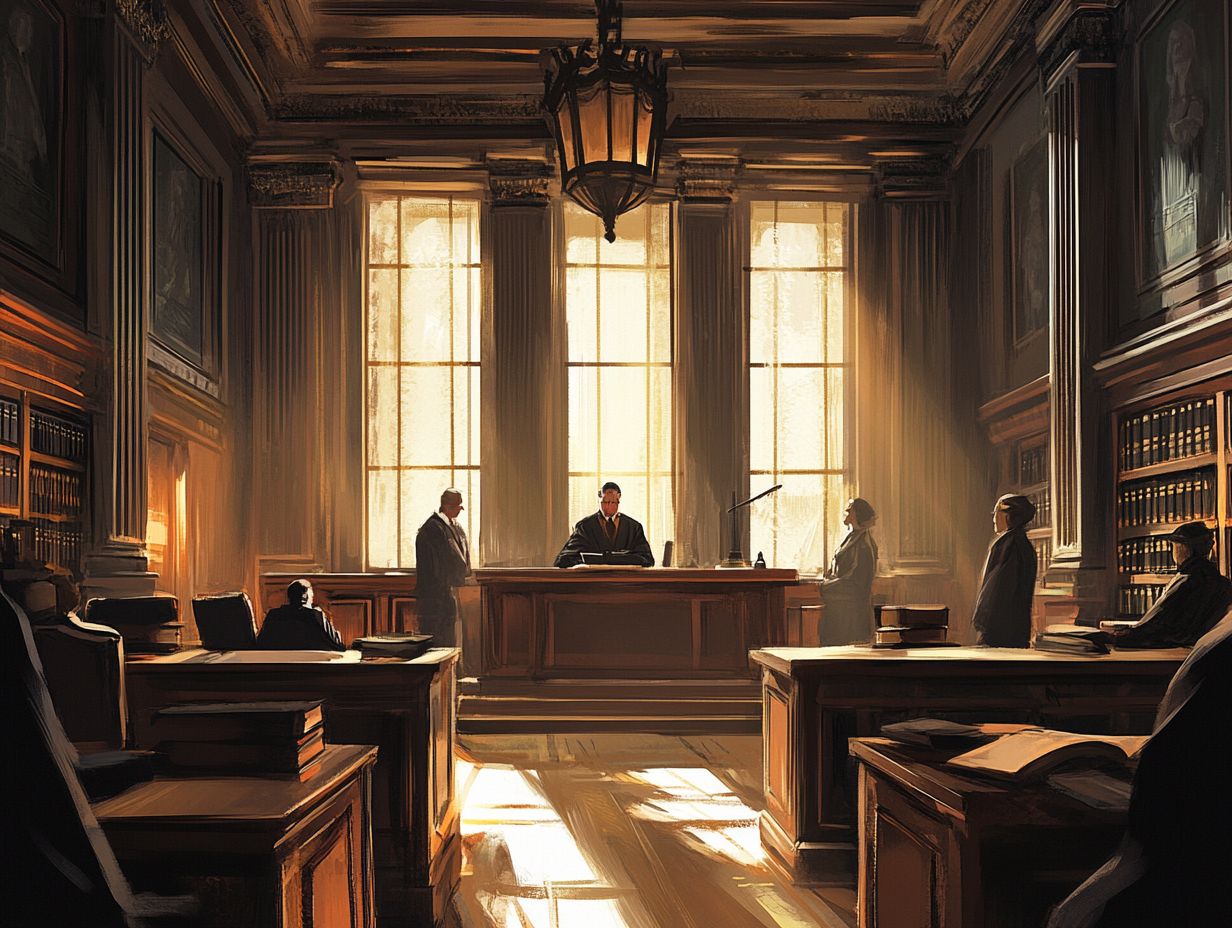
The legal process for requesting a change of venue begins with filing a motion. This document details your reasons for the request and presents evidence to support your case.
Attorneys must navigate specific procedures and deadlines dictated by local statutes and court rules, ensuring their arguments clearly demonstrate the necessity of relocating the trial to safeguard fair trial rights.
This endeavor requires meticulous preparation and a compelling presentation of evidence to persuade the court of any potential biases that could undermine juror impartiality.
If you find yourself in a situation where a change of venue could be necessary, consider reaching out to a legal professional for guidance!
Filing a Motion and Presenting Evidence
Filing a motion for a change of venue demands a strategic approach as a trial attorney. You ll need to gather and present compelling evidence to support your request. This evidence typically includes testimonials, statistical data about community characteristics, and examples of negative media coverage that could compromise a fair trial.
You should also introduce relevant case law and precedents that underscore the necessity of relocating the trial. This process entails a thorough examination of potential biases in the current jurisdiction and their impact on a jury s impartiality.
It s crucial for you to effectively persuade the judge regarding the rationale behind the motion. Highlight the importance of an unbiased trial and the integrity of the judicial process. By clearly articulating the risks associated with the current venue, you bolster your argument for a fair hearing in a more appropriate location.
Factors Considered in Granting a Change of Venue
When seeking a change of venue, several factors come into play, with the judge s discretion being a crucial element in the decision-making process.
Courts carefully assess the influence of negative media coverage, the characteristics of the community, and relevant precedents from similar cases when considering a motion for change of venue.
It’s essential for trial attorneys to grasp these factors thoroughly, enabling them to effectively advocate for their clients and ensure that the trial location preserves the integrity of fair trial rights.
Judicial Discretion and Precedent
The judge s ability to make decisions based on the case’s context and established legal norms plays a pivotal role in change of venue requests. The delicate balance between ensuring fair trial rights and addressing community sentiments often relies on how similar cases have been resolved. This shapes how you, as a trial attorney, frame your arguments.
Take, for example, the case of Sheppard v. Maxwell. This case demonstrates the importance of limiting media influence on jurors and significantly influences the approach to venue changes in high-profile trials. Such precedents carry substantial weight; attorneys frequently reference these historical rulings to bolster their motions, asserting that a fair trial is unattainable in a community saturated with media influence.
The decisions surrounding trial relocations not only alter the emotional dynamics of the courtroom but also reshape defense strategies. Legal teams must account for local attitudes and biases in their preparations. These considerations underscore the importance of meticulous judicial evaluation when it comes to addressing venue changes.
Challenges and Limitations of Change of Venue
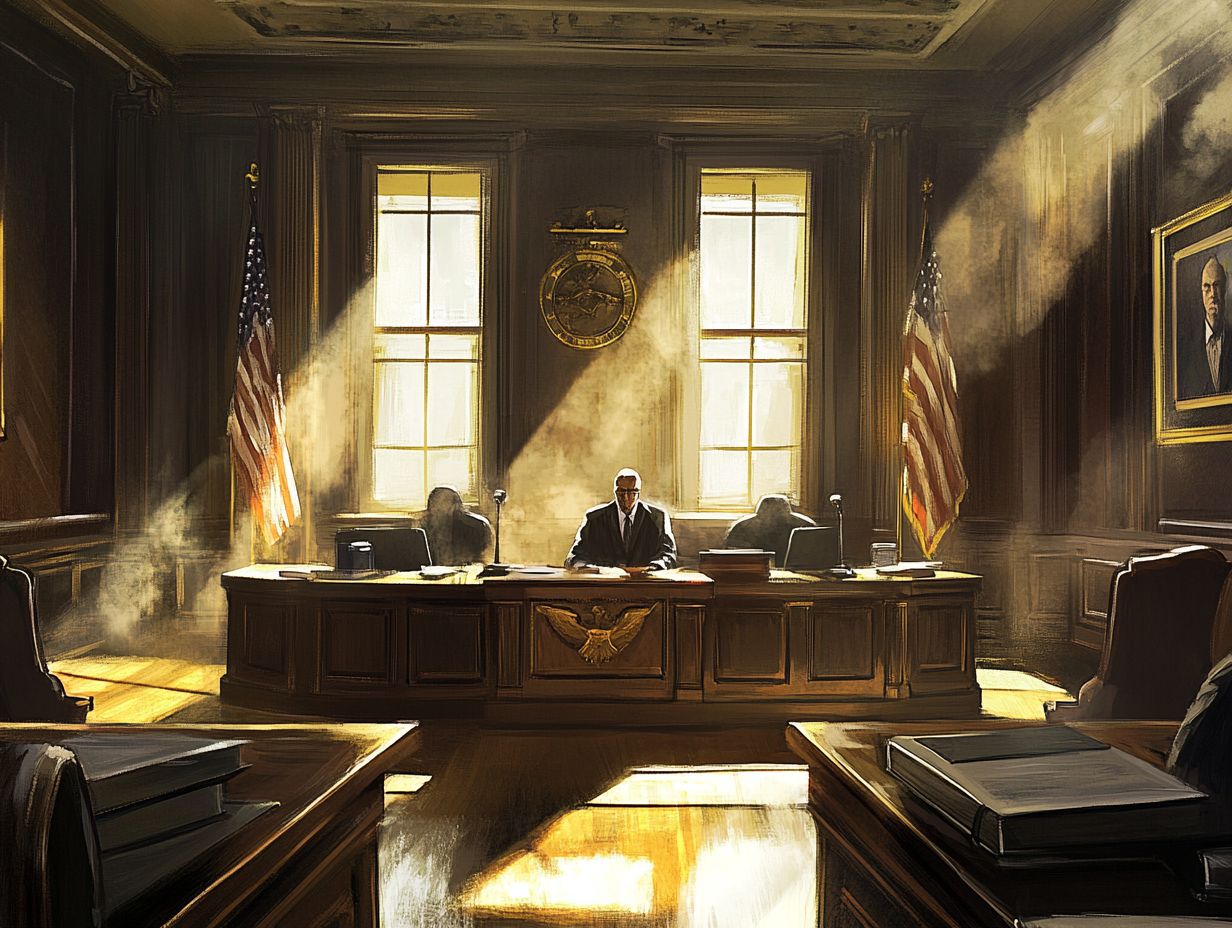
The challenges and limitations inherent in the venue change process can present formidable obstacles for trial attorneys striving to secure a fair trial.
A myriad factors, such as court jurisdiction, logistical complexities, and the specifics of the case, can complicate the effort to successfully relocate a trial, frequently leading to arduous legal disputes.
Possible Obstacles and Outcomes
Possible obstacles and outcomes of a change of venue motion can significantly influence the trajectory of your trial. As you navigate these challenges, you’ll encounter various hurdles that could affect your strategy and the final decision.
Community sentiments, limitations within the judicial district, and the perceived effectiveness of your motion can lead to unexpected results.
Navigating these complexities requires a keen understanding of local biases and media influence, both of which can shape juror opinions long before the trial begins. In a high-profile case, you can argue that these existing biases pose a serious threat to the fairness of the trial a motion that the court may or may not accept.
A telling example is found in State v. Smith, where the judge denied the change of venue, resulting in a jury pool rife with potential biases. You must be prepared for such outcomes; a denied motion might necessitate a more robust jury selection process to mitigate the effects of local sentiment.
Alternatives to Change of Venue
Exploring alternatives to a change of venue can equip you, as a trial attorney, with a range of sophisticated legal strategies designed to tackle bias or conflict without relocating a trial.
Techniques such as refined jury selection methods, tailored jury instructions, and effective management of pre-trial publicity can significantly mitigate the influence of community biases on juror impartiality.
Other Legal Strategies for Addressing Bias or Conflict
Consider employing legal strategies to address bias or conflict. Targeted jury selection processes and customized jury instructions can directly tackle negative publicity and community sentiment. These approaches effectively mitigate potential bias without requiring a change of venue.
By utilizing a carefully designed jury selection process, you can identify and exclude jurors who may have preconceived notions about the case. This fosters a more impartial jury.
Judges can also provide specific jury instructions that emphasize focusing solely on the evidence presented during the trial, guiding jurors away from external influences. For instance, a judge once instructed jurors to ignore media reports, which successfully minimized undue influences and contributed to a fair verdict.
These techniques not only protect the integrity of the legal process but also build trust in our justice system.
Frequently Asked Questions
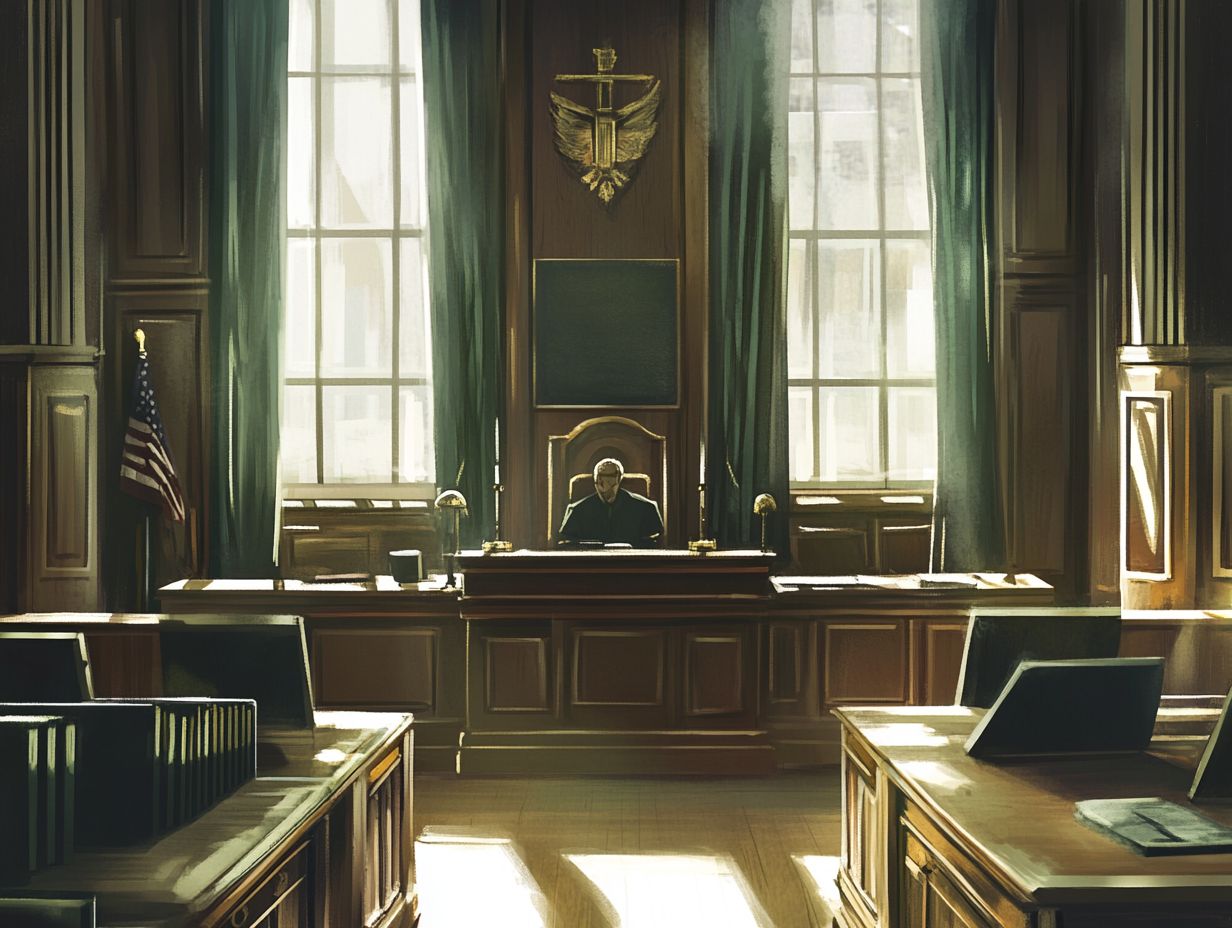
What is the right to request a change of venue?
The right to request a change of venue is the legal entitlement for a defendant or plaintiff in a court case to ask for the trial to be held in a different location. This is usually done to ensure a fair trial, free from bias or prejudice.
Who has the right to request a change of venue?
Both the defendant and the plaintiff have the right to request a change of venue. However, the request must be made in a timely manner and must include valid reasons for the change.
What are acceptable reasons for requesting a change of venue?
Acceptable reasons for requesting a change of venue include media coverage that could affect the fairness of the trial, a small community where everyone knows the parties involved, or a conflict of interest with the judge or jury in the current location.
How do I request a change of venue?
You can request a change of venue by filing a motion with the court. This motion should include a valid reason for the change and must be submitted in a timely manner before the trial begins.
Is there a guarantee that my request for a change of venue will be granted?
No, there is no guarantee that your request for a change of venue will be granted. The judge will consider the reasons for the request and determine if it is necessary for a fair trial. If the judge denies the request, the trial will proceed in the original location.
What happens if my request for a change of venue is granted?
If your request for a change of venue is granted, the trial will be moved to a different location. This new location may have different procedures or laws, so it is important to consult with your lawyer about any changes that may impact your case.
If you have further questions or need legal advice regarding a change of venue, please consult a legal expert.


